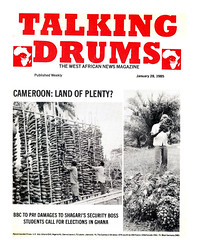Comment
Cameroon - Land Of Plenty?
Thus allowing even for the necessary hyperbole that all rulers and politicians feel obligated to indulge in, it was still a very brave statement for President Paul Biya of Cameroon to make that in his country everybody eats to his fill. But the fact that he could make such a claim at all is of great significance, and stripped of even the hype it is worthy of note.
Cameroon is, after all, an African country, the continent of hunger and starvation whose peoples live or starve to death depending on whether other nations are in a generous or mean mood. In most people's minds, the very mention of Africa only evokes images of drought, starvation, emaciated and sunken-eyed children, disasters and Oxfam appeals.
It is something of an achievement for an African country to even state that its peoples are not starving, let alone to be able to state categorically that there is enough for everybody to eat his fill.
A sizeable number of Cameroonians will probably disagree with President Biya and some people might even suggest cynically that he knows only about his own stomach and those of his officials and it is no wonder that he thinks that everybody else is full.
But by all accounts, the agricultural fair which provided the occasion for President Biya to indulge in such chest beating was a success and Cameroonians could be justifiably proud of it. It does not take much imagination to see the chaos all around them and with April 1984 still so very fresh in their minds, it is easy to see themselves as an oasis in the middle of a harsh desert.
When it comes to resources, Cameroon is not exactly very different from many other West African countries and the country's relative success must therefore be attributed to stability and the deliberate policy of underplaying the role of Cameroon on a global scale.
The oil boom hit Cameroon and Nigeria at the same time, Cameroon refused to acknowledge itself as an oil country and continued to emphasize agriculture, the revenue from oil becoming a bonus. Twenty five years ago the country became independent, almost three years after Ghana, nine months before Nigeria and before the flood of other independence celebrations; it allowed Ghana to pretend to be the most important and vital African country and did not seek to play any continental or global role and consequently succeeded in not attracting unwanted and destructive international attention.
Strange as it may now seem, Cameroon has never even hosted an Organisation of African Unity summit and spared itself the expenditure involved in staging the circus and the debts that have followed each one.
Quietly and without much fanfare the country has continued to prosper without the pressures that have followed such high flying neighbours as Nigeria or Ghana or Guinea and the fact that no military interventions have occurred also helped.
But then, as in the claim that everybody eats his fill, the calm and apparent success is very deceptive and hides many tensions, divisions and imbalances, some of which erupted and almost got out of hand in April 1984. The very name, 'United Republic of Cameroon' sounds like mockery on occasion, for Cameroon is far from united and north-south tensions are barely hidden below the surface.
As the ruling CNU party approaches its congress, it is obvious from the rumblings in the country that there is a movement afoot to make far reaching constitutional changes and make Cameroon a de jure one-party state.
It is our considered opinion that such a move will spell out a recipe for disaster and President Biya should not allow himself to be lulled into such a move. It is a fond hope shown to be even dangerous that legislating or decreeing a one-party state means the end of opposition and as every country in Africa that has trod on that road can testify, it only drives opposition underground and turns it into a destructive force.
Thus far, the constitution of Cameroon has allowed the existence of multi parties and it is a pity that no group has emerged to press a claim to that constitutional right apart from the announcement from Mr Ngwana late last year of his intention to lead a Cameroon Democratic Party. Such a move should be seen as a positive one and be encouraged by the government rather than to be frowned upon and seen as a subversive move.
If there are people in the Cameroon who go to bed with empty stomachs and never get to eat their fill, even though it might not have reached Ethiopian proportions yet, the chances are that President Biya will get to hear about them from an opposition much earlier and at a stage at which something can be done to prevent a large scale disaster.
Left to his own people, everybody will have full stomachs until the day a foreign television crew arrives to show the world that Cameroon is also very much an African country suffering from the same malaise with widespread hunger.
The experience under ex-President Ahidjo should provide a lesson in how eager people are to give the impression that all is well until the day comes when power has changed hands.
